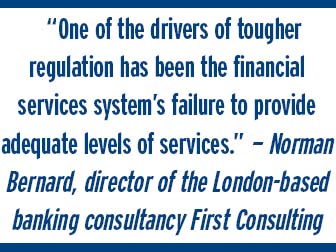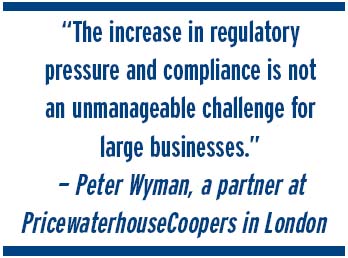New banking regulations could have as profound an effect on global businesses as any of the recently drafted codes of corporate conduct. Companies will ignore them at their own peril.

One morning a few months ago pandemonium broke out in the London office of a major international investment bank.The bank had successfully underwritten a 500 million sovereign bond for an East European country and now needed to open a temporary bank account in the name of the clients treasury to receive the proceeds of the bond issue. Unfortunately, the banks compliance officer ruled that the account could not be opened unless the bank obtained copies of recent utility bills from the countrys finance minister.
The bankers were spitting blood, according to one source present at the meeting. In the end they found a loophole that enabled them to open the account, but the whole business went right to the wire,with only hours to spare, he says. Initiatives brought out in the wake of the Enron collapsethe Mutual Funds Integrity and Fee Transparency Act, the Sarbanes- Oxley Act on corporate responsibility, and othersare often cited as harbingers of a coming tighter regulatory environment for corporates.The trend affects not just US companies. For instance, at least half of the companies that make up Britains FTSE100 have a US listing and are therefore bound by the new laws on corporate governance and disclosure.
While most organizations are well aware of the new rules governing corporate conduct, many are comparatively less aware of similar regulatory changes taking place in the financial services sectorand the impact they will have on the corporates businesses. Compliance is becoming one of the single biggest employers in the financial services industry, says Norman Bernard, director of the London-based banking consultancy First Consulting.The counter-party risk for corporates posed by the introduction of Basel II, for instance, is simply not properly understood.
With the final draft on the table and implementation only three years away, now is arguably the time for corporates to start

cementing good relations with their lender banks.The third consultative paper on capital adequacy will replace the 1988 Basel Accord, which was the first global attempt to set minimum levels of capital that banks need to hold against their core base.Under the new rules the focus for determining capital adequacy will shift squarely to credit risk, taking into account the numerous and often spectacular financial disasters that have taken place since the original proposals were drawn up. Under the final draft agreement credit ratings will become the yardstick banks will use in determining the level of risk involved in granting loans and accepting bonds issued by corporate customers.
All corporate loans are currently 100% risk-weighted under the current rules. For every $100 of loans granted to a corporate borrower a bank has to hold $8 of capital regardless of the customers rating. Under Basel II, the amount of capital banks have to put aside for loans to corporates will vary according to the risk level, rather than the status of the borrower. Companies that are considered a good risk will have lower capital requirementsand a lot will depend on relationships. This sort of company will find it easier to borrow from its banks.Conversely,any adverse development or downgrade will increase the cost of borrowing.As distortions caused by the present rules are removed, borrowers should see their cost of debt relate more closely to their credit ratings.
Bonds Set For a Boost
While all corporate borrowers are now rated 100%, going forward this will vary according to the level of risk, moving from 30% to 150%.The amount of capital a bank has to hold against its corporate clients will decrease significantly for better-rated companies.The whole thrust of Basel II is to make lending more risk-sensitive, and that, almost inevitably, will lead to more polarization between the haves and the have-nots. Poorly rated companies can expect to see their cost of borrowing go up, which in turn could undermine their established relationships with their banks.
While it will cause considerable upheaval in the loan market, Basel II will be a boost for the corporate bond market, particularly in Europe, where corporate issuance has lagged behind that in the United States.The higher a corporate is rated, the lower the credit charge against its paper and the lower the costs of issuing bonds.The proposed increase in the risk weighting for low-grade debt could also lead to more bond issuance as companies in this category pay a higher premium on their borrowings in the lending than in the bond market. Corporates rated B- or lower by the three major rating agencies will see their capital weighting go up to 150%.
Currently, this affects a large number of mid-cap corporates in the UK and Europe. For instance, if a BB-rated company begins to slip and is downgraded, its bank needs to put up 50% more capital, which will raise the price on lending. This should promote some growth of the high-yield market, as corporates in this category will get better financing from the bond market than from banks that have to put up 12% of their capital against a loan8% times the 150% risk weighting, versus a much more attractive 2.4% capital requirement for loans made to the best-rated companies.
Basel II will potentially usher in a credit squeeze for those corporates falling into the 150% bucket. Analysts say this is likely to lead to a period of transition, as companies start shopping around for friendly banks willing to help them rebuild their balance sheets and fund expansion plans.
Fewer Regulators, More Regulations
The move toward a tighter regulatory framework is, like many legal and business trends, a US import in most parts of the world, Britain being no exception.Sarbanes- Oxley will broadly set the tone for regulating UK companies as well, says Peter Wyman, a partner at PricewaterhouseCoopers (PwC) in London. The climate will be tighter than it used to be, and given the size and scope of global companies there will be more bureaucracy to deal with.
However, on this front the British government has stolen a march on Washington by creating the worlds most comprehensive regulatory body, the Financial Services Authority (FSA).While regulatory powers in the US are split between various bodies, including the SEC and individual state agencies,the FSAs brief covers all areas of financial activity, from retail and wholesale banking to money laundering and corporate governance.
One of the drivers of tougher regulation has been the financial services systems failure to provide adequate levels of services, says Bernard.The government reacted to that by putting in more regulation. This has kick-started other governments, like the Irish and the Germans, into setting up their own single supervisor.
The trend is already embedded in the corporate sector, affecting the operational as well as corporate governance side of business. In a groundbreaking decision in December, Britains Competition Appeal Tribunal urged the Office of Fair Trading (OFT) to refer more takeovers to the Competition Commission. The result is that mergers stand to cost more and take longer.
In comments about the firstever merger decision to be challenged before the three-person tribunal, Sir Christopher Bellamy, its president, said that only exceptionally should the OFT try to resolve mergers where there was a real question as whether there is a substantial lessening of competition. Competition lawyers say the decision is likely to encourage competitors to take more merger challenges to the tribunal and would probably lead to more references to the Competition Commission.
Drive for Transparency Continues

A more draconian regulatory environment is almost certainly in the cards as supervisors, intent on safeguarding the integrity of their countries leading corporates, run their magnifying glasses over a wider range of company activities, while simultaneously intensifying their crackdown on terrorism and money laundering. Whether its Brussels or London or Washington, the natural proclivity of regulators is to seek more things to regulate, says Philip Middleton, head of retail banking at Ernst & Young.They dont arrive at work thinking what regulations they can cut back. For instance, the European Commission is hard at work trying to get tax harmonization powers for its member states.The trend is to greater transparency and fewer tax haven boltholes for shifting profits. Companies with multinational operations will be concerned about cross-border transfers.
As if on cue,in the wake of recent US legislation the Eu- ropean Commission has activated its directives team to roll out a series of initiatives on corporate governance and transparency. Last May the EC brought out a plan, Modernizing Company Law and Corporate Governance, that will eventually involve a number of directives on tightening up corporate practices. Then there is the Financial Services Action Plan, covering prospectuses, transparency and company law, among other areas.
But Europe has seen the emergence of strong resistance from the corporate sector to at least one attempt to push through legislation on transparency.The European Commission is trying to introduce a law that would force companies to move to quarterly reporting, now a rarity in most EU member countries.Its really open to question whether this will go ahead, says Trevor Pitman, group managing director at Fitch Ratings. A lot of companies oppose this on the grounds that it obliges them to take too short-term a view of their business. Our view is that is doesnt encourage short-termism, but greater transparency.However, for now this EU initiative seems to have failed.
One of the thorniest obstacles to governance reform in the various EU member states is the fact that, with the exception of Austria and Luxembourg, each of the 15 countries has its own code. This diverse approach to governance is largely driven by differences in legal frameworks between the different member nations.In continental Europe, for example, more concentrated ownership structures, often involving family and cross-financial-industrial ownership, result in governance structures and processes that differ from those in the UK.
On the other hand, the private sector in the UK is working on an agreement to introduce a greater degree of standardization on covenants in corporate bond documentation, at the behest of investors.The effort, now at the debating point, is being led by Barclays Global Investors, fund managers M&G; and Gartmore and, unlike the EU directive on quarterly reporting, is expected to go ahead in the near future.
Playing Trans-Atlantic Catch-Up

It is logical to expect supervisors and regulators to seek out other areas of company life that they believe need to be brought under scrutiny. As far as European companies are concerned,theyve got a long way to go to get up to levels of being best-in-class in terms of how much information is made available to shareholders, says Nick Bradley,European practice leader of governance services at Standard & Poors.
Companies need to make shareholders more aware of their rights than they currently do,Bradley says.The UK is widely regarded as the bastion of disclosure, but very few British companies disclose their articles of association, something that most German corporates make available on their Web site. Directors remuneration is another bugbear. It is important to understand how directors are compensated, and outside the US and Britain you dont get a lot of information on this. These are all potential future targets on which regulators might train their sights.
Bradley points out that shareholder activism in Europe is still in its infancy,with the spotlight focused primarily on US and UK firms. The Anglo-American economies are very equity-centric, he explains.The equity cult has been less prevalent in Europe because of the structure of the market,which involves a significant amount of cross-shareholdings. Nevertheless, given the more opaque nature of the European markets, when disaster strikes it tends to be on a dramatic scale. Witness the scandal at Dutch retailer Ahold, which overstated earnings by $500 million, an event that put Europes securities regulators and accounting profession on the defensive. French media conglomerate Vivendi Universal saw its shares collapse by a third following reports of the companys attempt to massage its books to the tune of 1.5 billion.The engineering and power group ABB was brought to its knees by corruption charges.
PwCs Wyman is hopeful the regulatory scene will now settle down to a post-Sarbanes-Oxley environment. There will undoubtedly be more bureaucracy, and the climate will be tighter than in the past. The increase in regulatory pressure and compliance is not an unmanageable challenge for large businesses, he says. Increased regulation is not necessarily welcome,but they can cope. A bigger issue is not so much one of regulation, but whether analysts, journalists and corporate governance people will allow company leaders to get on with their business.
By Jules Stewart



